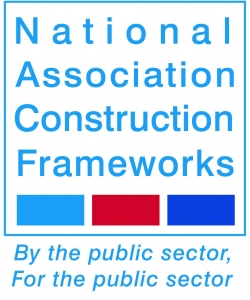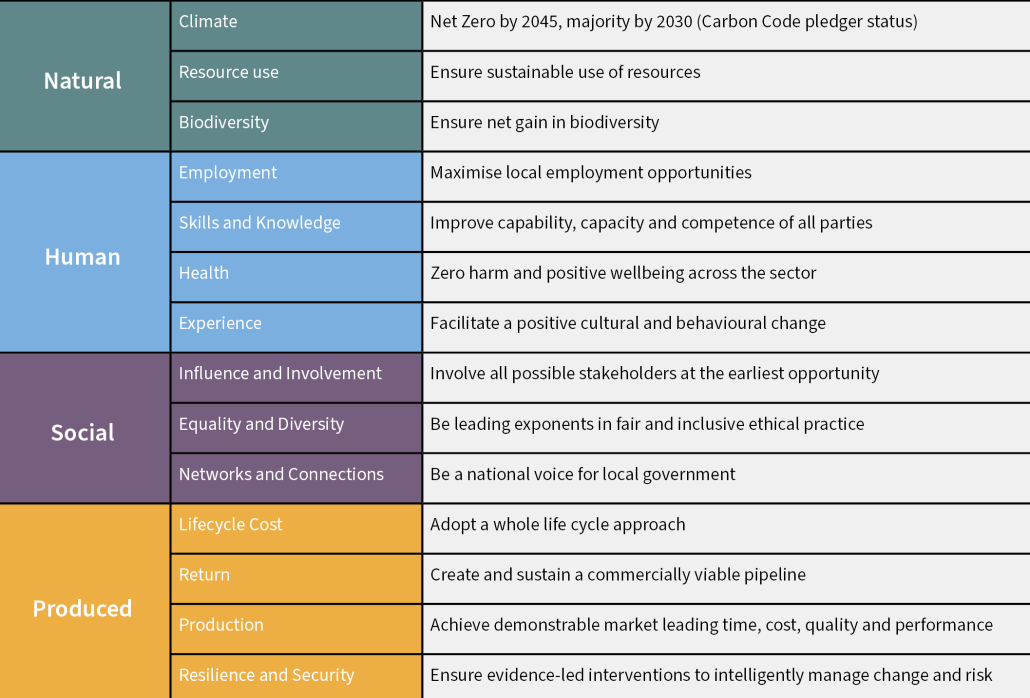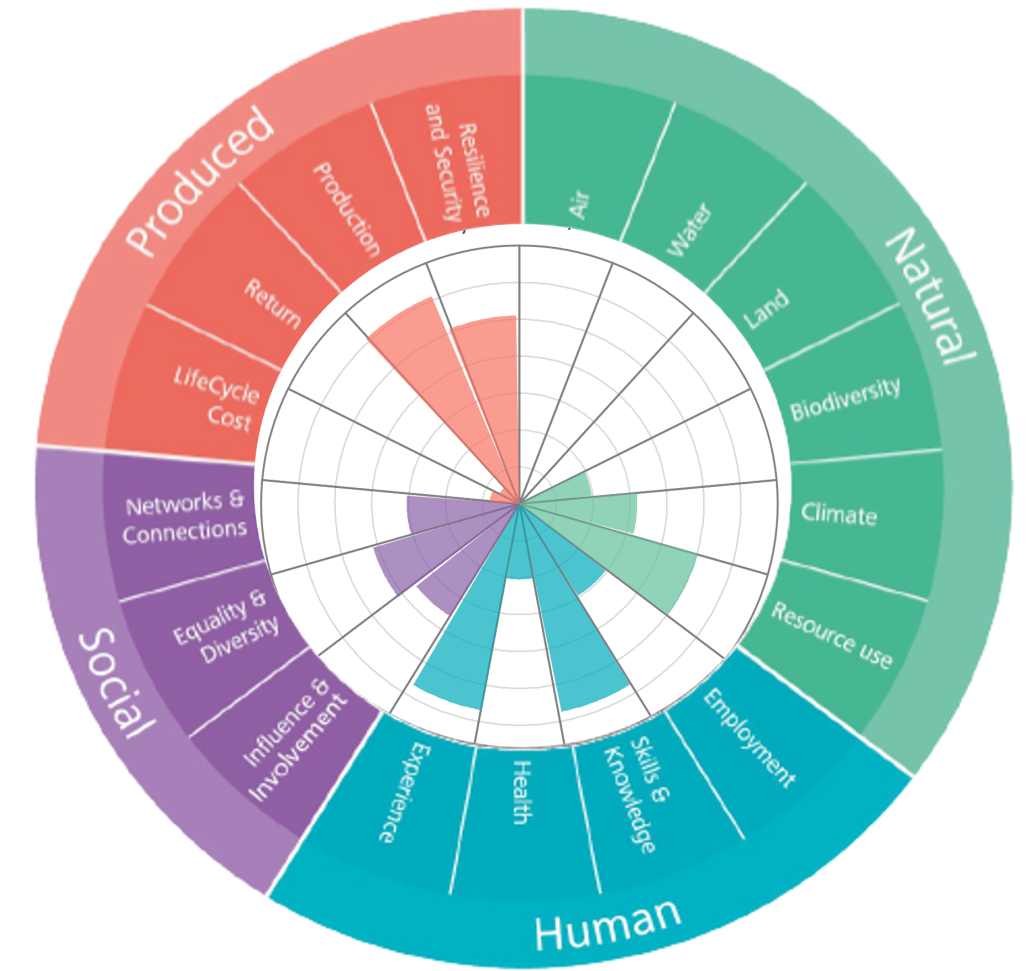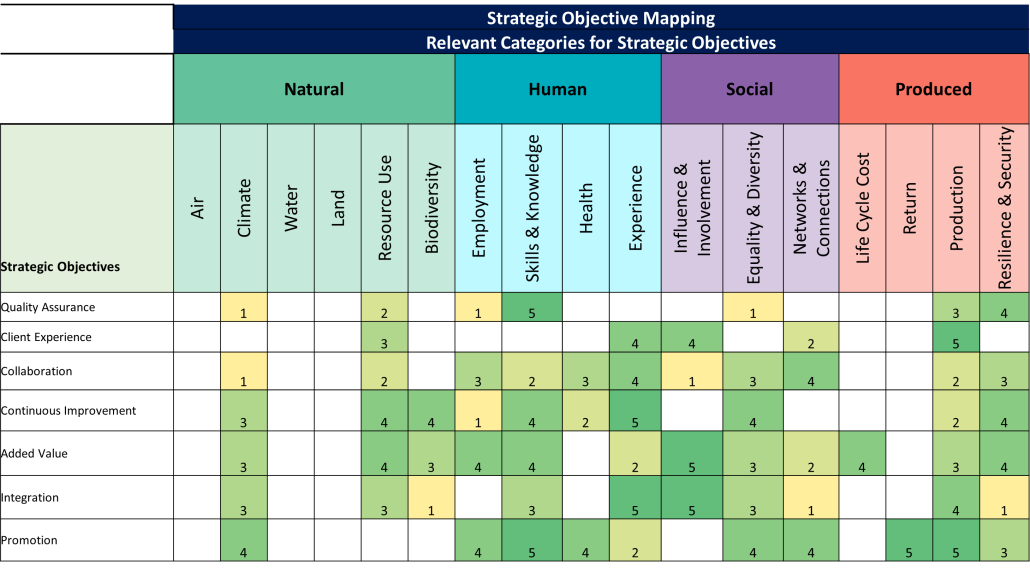Introduction to the Value Toolkit
The Value Toolkit has been created by the Construction Innovation Hub to help clients make value-based decisions regarding their procurement.
The Value Toolkit is a suite of tools to empower clients and policymakers to make value-based procurement decisions that will result in the environmental, social, and economic outcomes they want. This profile is a visual representation of where the project team believe the value in your project is.
The NACF have supported the Value Toolkit throughout its development and have used it to agree the outcomes that we seek to achieve through our active management of local government frameworks. The NACF team have used the toolkit to capture the desired outcomes of NACF Framework Management.
Our NACF Chair, Keith Heard is a fully trained Value Toolkit facilitator and will be able to help you create a value profile for your project.
Natural Capital
Natural Capital is defined as the stock of renewable resources (e.g. plants, animals, air, water, soils minerals) that combine to yield a flow of benefits to people.
In the context of the built environment, Natural Capital values the natural environment, addresses solutions to climate impacts and provides benefits to society throughout the full life cycle of the built assets.
- Air
- Climate
- Water
- Land
- Resource Use*
- Biodiversity
What Natural Capital means for the NACF
The NACF have supported the Cambridge Carbon code and committed to achieve Net Zero status by 2045, in majority by 2030 (pledger status). NACF has committed to the ongoing reduction of resource use by promoting tools to ensure sustainable use of resources and a life cycle approach to project delivery. NACF has been at the forefront of Biodiversity Net Gain and Nutrient Neutrality legislation, providing tools, training, and briefing, to ensure clients are prepared as legislation evolves.
Human Capital
Human Capital is defined as the knowledge, skills, competencies and attributes embodied in individuals that contribute to improved performance and wellbeing.
In the context of the built environment, Human Capital encompasses employment opportunities, skills development, individual health and wellbeing as well as an assets’ capacity to influence these factors.
- Employment
- Skills and Knowledge
- Health
- Experience
What Human Capital means for the NACF
Human Capital is key to the NACF Value Profile, as it is an area where we can really add value to project delivery. We are committed to Maximise local employment opportunities, improve skills and knowledge in the industry, ensuring capacity and competence throughout. We commit to Zero Harm policies and the promotion of wellbeing across the sector, wherever possible facilitating positive cultural and behavioural change.
Social Capital
Social Capital is defined as the networks together with the shared norms, values and understanding that facilitate cooperation within and among groups.
In the context of the built environment, Social Capital refers to influence and consultation, equality and diversity, networks and connections as well as the changes people experience in these areas as a result of built assets.
- Influence and Consultation
- Equality and Diversity
- Networks and Connections
What Social Capital means for the NACF
NACF seeks to involve all possible stakeholders at the earliest opportunity, leading exponents in fair and inclusive ethical practice, as a National Voice for Local Government, upholding high standards in the public sector to ensure the most effective delivery of public services through people and place.
Produced Capital
Produced Capital is defined as the man-made goods as well as all financial assets that are used to produce goods and services consumed by society.
In the context of the built environment, Produced Capital encompasses a combination of capital cost, operational cost and revenue, thereby covering the whole of the direct monetary spend on the project over its whole life. The man made elements include indicators of the efficiency and quality of design, construction and operational processes.
- Life Cycle Cost
- Return
- Production
- Resilience
What Produced Capital means for the NACF
NACF adopts a whole life cycle approach to all projects, promoting our frameworks to create and sustain commercially viable pipelines to benefit all stakeholders. NACF has a proven record in demonstrable market leading time, cost, quality, and performance – by driving evidence-led interventions to intelligently manage change and risk.







